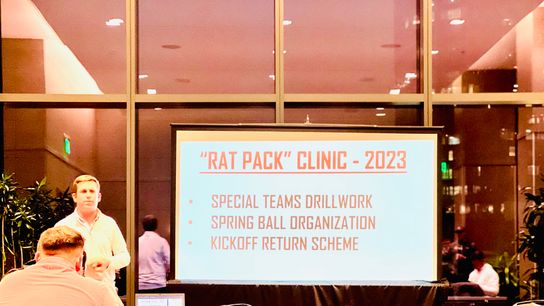CHARLOTTE, N.C. -- Football’s version of ‘Six Degrees of Kevin Bacon’ takes place inside an unadvertised ballroom within a posh downtown Charlotte luxury hotel.
It is invitation only, closing in on a decade since its inception, and transcending the global pandemic that two years prior had cancelled the American Football Coaches Association’s annual convention.
On this night, coaches are back together.
Some 15 or 20 at first. Football Bowls Subdivision. Power 5. Group of 5. Football Championship Subdivision. Division II. NAIA. High school.
An invitation, not a school name or coaching title, means you belong.
Gerad Parker, from tiny Louisa, Kentucky, population less than 2,500 and sitting along West Virginia’s western border, is warming up the room with an impassioned mix of tent-revival preacher reverence and ‘Football Guy’ plain talk.
Inspiration is the late Phil Ratliff, then a member of Charlotte’s staff who died in 2015 after a tragic cardiac event, and this group is his flock.
Parker is Notre Dame’s tight ends, a 2022 FootballScoop Coach of the Year finalist, and carries with him in industry circles the blessed and demanding label of “future head coach.”
“Just so happens to be where I grew up and where I’m from and where Dontae Wright, the safeties coach at West Virginia, is from and where a guy named Jason Michael, who’s the tight ends coach for the Philadelphia Eagles, is from,” Parker booms, the room now creeping close to standing-room-only. “And all of this crazy game of football brought us together in this small little town.
“And the reason why I played or started to play was because of Phil Ratliff, because Phil was like this, if you didn’t know him or you heard a story about him, Phil was like the ultimate badass. Greg Adkins recruited him; he’s now at South Carolina. Bill Legg is here, he went to Marshall, played at Marshall, was a two-time All-American at Marshall, won a national championship with a guy named Troy Brown; God, I hope people in here still know who Troy Brown is.”
Like many in the room, Parker’s is a coaching arc of the rise; others are entrenched in their respective posts.
Almost everyone sits with notepads and pens, a few have laptops, and there’s an occasional yell of reaffirmation turning this otherwise staid conference room into a football classroom.
With experience at Charlotte and West Virginia, among other programs, Tyler Hancock kicks off the tutorial portion of the gathering with special teams breakdowns.
“If you don’t have leverage, get it,” Hancock commands. “If you’ve got leverage, keep it.
“And if you can’t get it, cut bait!”
The crowd roars approval, Hancock’s teachings echoing those of many in the room and reinforcing a foundational tenet to teams units around the sport.
Justin Manning, Tufts University’s defensive coordinator, also is presenting to the room. Manning waxes for some 15 minutes on the minutiae of how his defensive linemen are taught to read defenders and work off blocks, to coverage elements and controlling the line of scrimmage.
The Jumbos are coming off their best season at the NCAA Division III level since 2018. Manning’s impact on the defense – it is statistically one of the program’s best in more than a decade, shaving more than eight points per game off its 2021 scoring average and notching a seven-sack game in a win against Colby – is undeniable.
Manning doesn’t emphasize his specific teachings, extol the benefits of his Power 5 experience at Duke on the staffs of esteemed college football veteran David Cutcliffe or talk about gimmicks.
He wants those in the room to remember one overarching element: they’re coaching people.
“At the end of the day, our guys started believing it because they had more confidence,” Manning says. “And what I will leave you all with and what I’ve learned is just the human element of it. Don’t take out the human element in coaching.”

Manning recalls the sudden-change moments of games lending themselves to frantic coaching calls and sensing his players’ need instead for empowerment.
“I started seeing it in change of possession, right?,” he says. “Guys are sitting there, drinking water, talking and now they gotta go run out there and I’m calling something. And a guy gets chewed. Come on. Let the car get started. Give these guys a chance to get going and don’t lose sight of the human element, getting caught up in some bs-coaching in the moment.
“We did some things that we can be happy about, but the kids bought in and they played hard and at the end of the day that’s what it’s about. It doesn’t matter what I draw up here; if they play hard and believe in what we’re doing, we got a chance.”
There are more than a half-dozen speakers during the course of the ‘Rat Pack’ session. FCS head coach Tre Lamb, coming off a watershed season featuring the school’s first-ever FCC Playoffs berth, subsequent win, and with a coaching tree already sprouting limbs is among them.
So, too, is new West Virginia wideouts coach Bilal Marshall.
A former wideout under Parker at Purdue and already with coaching experience at a Florida high school, as well as serving as the full-time wide receivers coach under Scott Wachenheim and Patrick Ashford at VMI, Marshall is in his first weeks as the Mountaineers’ wideouts coach.
It matters none. Soon, he’s commanding the room – and even before Marshall dives into his first teaching technique, he fields a question from the floor.
Tyler Bowen is Virginia Tech’s offensive coordinator, owns Big Ten experience at both Maryland and Penn State, and is entering his second season coordinating the Hokies’ offense after spending the 2021 campaign as an NFL assistant coach.
Bowen just ones to know one thing.
“Bilal, you gonna talk about the punch-off?,” Bowen quizzes.
“You’re damn right,” Marshall says.
“I love that,” Bowen says, numerous coaches echoing their regard for the technique. “I love that.”
“C’mon, now,” says Marshall, relishing the moment. “That’s the secret sauce.”
And Marshall shortly thereafter provides the video evidence. The move, for which Parker and others insist Marshall deserves credit for honing during his playing days at Purdue, involves a receiver creating an opportunity to “punch off” a defender – usually a strike to the chest-plate – to legally create separation on a route.
Already cultivating a reputation as heir apparent to some of the sport’s great young wideouts coaches in a crowded field that includes Ohio State’s Brian Hartline, Notre Dame’s Chansi Stuckey and Washington’s JaMarcus Shephard, among others, Marshall also sheds insight on what he asks of his receivers for each pre-snap read.
“Is it one-high or two-high, man or zone, and who is the flat player,” he shares. “How do we determine that?
“We look at our near triangle. That’s our near ‘backer, our near safety, and our near corner.”
More coaches teach throughout the evening, more stories flow and more bonds are cemented.
Parker notes that Ratliff’s coaching is quite literally living on inside the room.
“We lost Phil way too soon, so full circle right in the front row is a guy named Dylan Ratliff, and Dylan is Phil’s son, who’s now going to G.A. at Charlotte for a game named Mike Hartline, who I met at the University of Kentucky,” Parker says. “You all get my point?
“We are all connected.”
The human bond is the element for which Parker hopes ‘The Rat Pick’ keeps Ratliff alive.
“I couldn’t be more humbled to stand in front of you and talk about Phil,” says Parker, who shares four children with wife, Kandi, and traces his coaching evolution from Kentucky high school to UT-Martin, Penn State, West Virginia and now the sport’s most famous brand, Notre Dame. “When we came to a convention, I remember Gunter Brewer walks in as one of the best wide receivers coaches in the country, and Gunter Brewer would text me to talk ball at the convention. And I thought, ‘Why in the hell would he be texting me to talk about wide receiver play?’ And it’s because he wanted to gain as much information and knowledge and piece it all together and put together as he could. And I admired that about Gunter. Me and him have stayed in touch and been friends since. And Gunter was at Marshall with Phil. I could keep going on all night about the connections, but the point is, it just brings us all here and brings us together for a bigger purpose and it will remind us that we’re not just coaching ball.”
Parker, and the group gathering here, are reminding one another that they are purposing for more than a salary.
“We’re not just making a little bit of money, some kind of money and a lot of money,” Parker shares. “We’ll all make in between all of the above. But you know what? It doesn’t matter if you don’t have people to share it with.
“Bringing people together to celebrate a life and making sure we remember a man who stood all that was coaching, the convention, planning, the care for all, and all those things matter, and nobody did it better than Phil Ratliff.”
His proof fills the room.
